DAVID LOEB
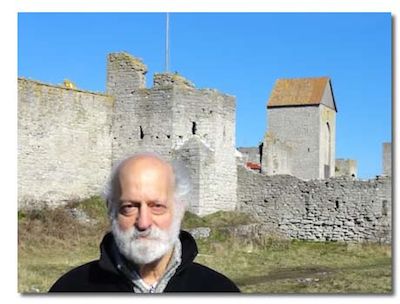 BIOGRAPHY
BIOGRAPHYDavid Loeb was born in 1939 in New York into a family which took music and painting very seriously. He studied composition with Peter Pindar Stearns at the Mannes College of Music in New York, and then completed a master's degree at Yale.
1964 became a critical year for his future. He began teaching at Mannes and has remained on the faculty there ever since, simultaneously teaching at the Curtis Institute from 1973 until 2000. Receiving a commission to compose a piece for an early music ensemble resulted a continuing involvement with writing for historical instruments, especially viols. Later that same year he began studying traditional Japanese music with Shinichi Yuize. This also resulted in a permanent and intense involvement (not only as a composer) and a succession of collaborative projects with Yuize-san until his recent passing away.
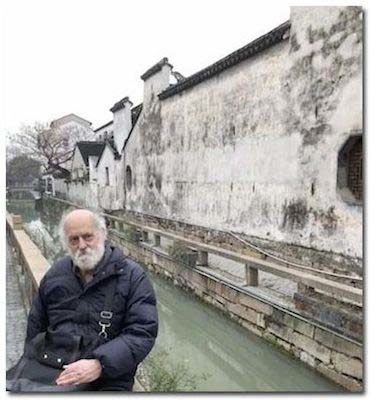 His catalog of compositions is unusually extensive and diverse. In addition to the expected assortment of works for orchestra, various chamber combinations, soloists, and voice, he has also written many pieces for Asian instruments (in addition to Japanese, some for Chinese, Korean, Thai, and Mongol) and for early Western instruments (in addition to viols, some for lute, harpsichord, and recorder). He has often brought these instruments together in unique combinations, such as four shakuhachi and four viols; flute, guitar, koto, and shakuhachi; and khaen, flute, guitar, cello, and percussion. More than one hundred of his compositions have been recorded in an anthology of 22 CDs on the Vienna Modern Masters label (including the three pieces referenced above), and about thirty other pieces appear on various other labels. Fifteen of his compositions (mostly for piccolo) are published by ALRY, several other pieces (an orchestra piece and viol pieces) have been published by PRB. Additional pieces were published by the Viola da Gamba Societies of the US and Japan.
His catalog of compositions is unusually extensive and diverse. In addition to the expected assortment of works for orchestra, various chamber combinations, soloists, and voice, he has also written many pieces for Asian instruments (in addition to Japanese, some for Chinese, Korean, Thai, and Mongol) and for early Western instruments (in addition to viols, some for lute, harpsichord, and recorder). He has often brought these instruments together in unique combinations, such as four shakuhachi and four viols; flute, guitar, koto, and shakuhachi; and khaen, flute, guitar, cello, and percussion. More than one hundred of his compositions have been recorded in an anthology of 22 CDs on the Vienna Modern Masters label (including the three pieces referenced above), and about thirty other pieces appear on various other labels. Fifteen of his compositions (mostly for piccolo) are published by ALRY, several other pieces (an orchestra piece and viol pieces) have been published by PRB. Additional pieces were published by the Viola da Gamba Societies of the US and Japan.Having studied flute intermittently as a youngster brought him rather indirectly to playing Japanese transverse flutes (shinobue, kagurabue, and komabue), performing for the first time in 1983. In addition to many unaccompanied performances he has also played in various chamber contexts, and also as a soloist with orchestras, chorus, guitar ensemble, percussion ensemble, and with ensembles of Japanese instruments.
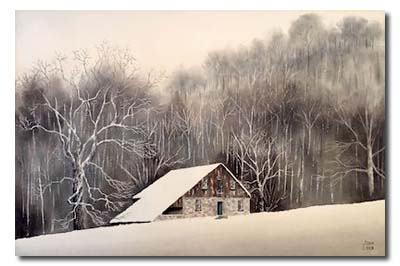
He has also done original research on a variety of topics of an analytical nature. Extended articles have appeared in The Music Forum (vols. II and IV), Schenker Studies, and Structure and Meaning in Tonal Music. Shorter articles have appeared in journals in the US and Japan.
Here are two of my parents' paintings. "The Old Mill" (John Jacob Loeb, 1965) depicts a rural scene in Eastern Pennsylvania, an area which they often visited on painting trips. The restricted palette gives it a sense of quiet strength.
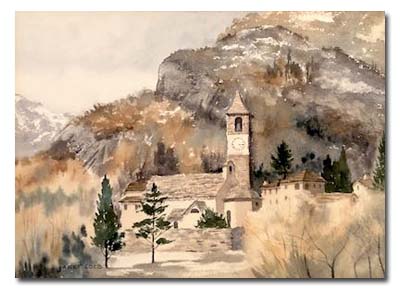
"A Swiss Village" (Janet Pforzheimer Loeb, ca. 1975) depicts a village not too far from Zurich, where her sister and bother-in-law had a second home. He had been born and raised and Switzerland and retained strong ties to that country.
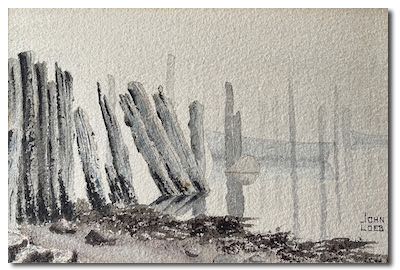
Here are two miniature paintings which inspired the "Two Miniatures" for an unspecified instrument, recorded by oboist Rita Mitsel on the Centaur label.
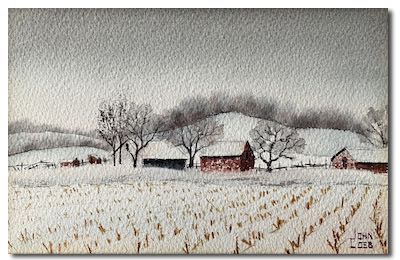
Copyright © 2024 David Loeb, All rights reserved.